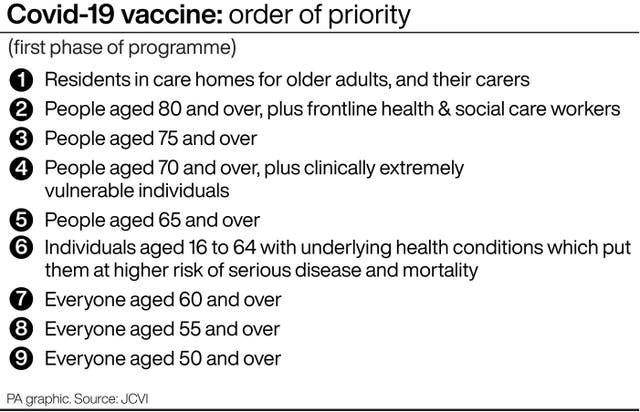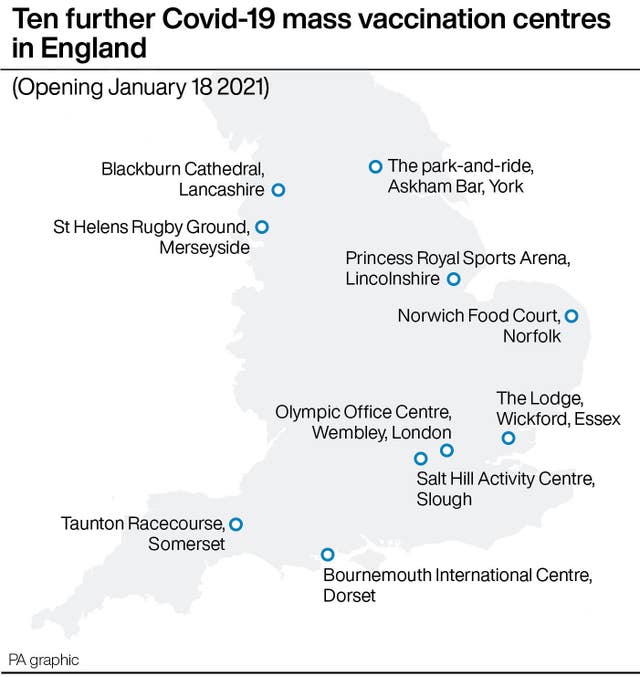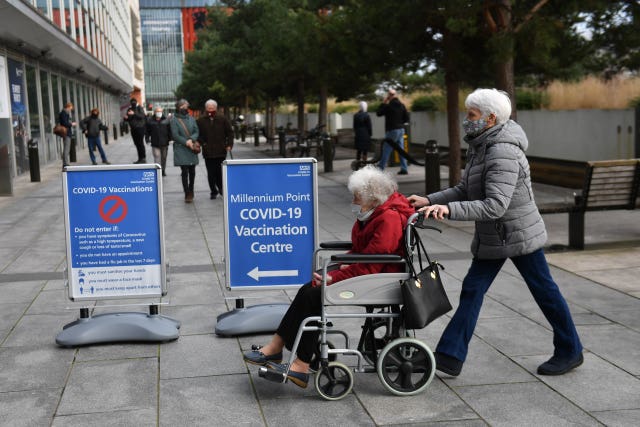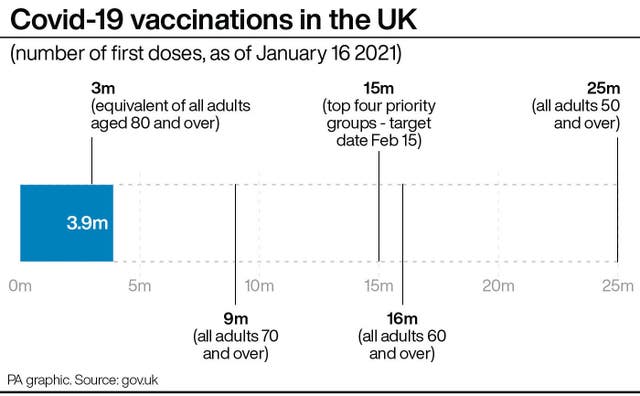
Coronavirus vaccines are now being offered to millions of the most vulnerable people across the country.
Coronavirus vaccines will be offered to over-70s and the clinically extremely vulnerable this week as the Government moves to the next stage of the vaccine rollout.
More than 3.8 million people in the UK – including over-80s, care home residents, and NHS and social care staff – have already received their first dose of a Covid-19 vaccine, but from this week it will be rolled out to the next two priority groups.
The Government said it would remain the priority to vaccinate those in the first two groups, but that sites which have enough supply and capacity to vaccinate more people will be allowed to offer jabs to the next cohorts.
Here the PA news agency has outlined who is eligible to receive a jab at the moment and how people can book their vaccination appointment.
– Who can get the vaccine?
 (PA Graphics)
(PA Graphics)
The top four priority groups are now eligible to get their coronavirus vaccine in England, meaning people who work in health and social care, as well as everyone over the age of 70, care home residents and those who are clinically extremely vulnerable could now be contacted for an appointment.
The top priority groups are over-80s, care home residents, and NHS and social care staff, and the Government said it will remain the priority to vaccinate them.
But sites which have enough supply and capacity to vaccinate more people will be allowed to offer jabs to the next cohorts, after Prime Minister Boris Johnson pledged to offer vaccinations to the first four priority groups by the middle of next month.
The priority list has been decided by the Joint Committee on Vaccination and Immunisation (JCVI) – an independent expert advisory committee.
In Northern Ireland, phase one of vaccinations will similarly focus on care home residents, staff, as well as people over 80 and health care staff.
In phase two, jabs will be handed out to people over 75, before moving down to those aged 70-plus and 65-plus as well as other adults with health conditions which leave them vulnerable.
Other adults over 50 will then be vaccinated in the third phase.
– Where can I get the vaccine?
 (PA Graphics)
(PA Graphics)
Across the UK, vaccines will be distributed at a range of locations in the community, including GP surgeries, hospitals, and mass vaccination centres.
This week, a further 10 centres will open at locations around England – including Wembley and Norwich food court – joining the seven which began administering the vaccination last week at places such as Millennium Point in Birmingham and the Centre for Life in Newcastle.
There will be 35 mass vaccination centres across Wales and there are proposals for similar locations in Scotland.
Alongside GPs, in Northern Ireland there are seven large trust sites where jabs will be distributed, including the Royal Victoria Hospital in Belfast and Seven Towers Leisure Centre in Ballymena. Mobile teams will deliver the vaccines to care homes.
– How do I get booked in for a vaccination?
 Members of the public arrive to receive their Covid-19 jab at the NHS vaccine centre at Millennium Point centre in Birmingham (Jacob King/PA)
Members of the public arrive to receive their Covid-19 jab at the NHS vaccine centre at Millennium Point centre in Birmingham (Jacob King/PA)
People in England who are eligible for the vaccine will receive a letter from either their GP surgery or the NHS nationally.
The letter will include all of the information needed to book their two jab appointments online.
People will be asked for some personal information, before being able to select a place close to home where vaccines are being administered.
Locations will be made available depending on their distance from a person’s home and capacity to offer jabs.
Appointments for the first and second jab are booked at the same time, with the second following around 11-12 weeks after the first.
Separately, GP surgeries can also communicate with their patients and offer jabs over the phone or via text message, depending on when they receive supply of the medicines.
In Wales, appointments and invitations are being arranged via letter and over the phone, and there will be a similar process in Scotland.
How do I know I am not being scammed?
The COVID-19 vaccine will always be available free of charge and the NHS will never ask you to share bank details to confirm your identity, or pay for a vaccine.
Find out more about the #CovidVaccine. 👉 https://t.co/1e3nCAUFcB pic.twitter.com/wzVyedGIkD
— NHS England and NHS Improvement (@NHSEngland) January 18, 2021
Some people have reported receiving fraudulent text messages or phone calls in relation to the Covid-19 vaccine.
According to older persons charity AgeUK, some people are asked to press a number on their keypad or to send a text message to confirm they wish to receive the vaccine, which could add a charge to their phone bill.
In other cases, callers are offering the vaccine for a fee or asking for bank details.
You will never be asked to pay for a coronavirus vaccine.
Any contact over the phone, email, or text message asking for your bank details in relation to a vaccination appointment is a scam.
AgeUK said the NHS will: “NEVER ask you to press a button on your keypad or send a text asking you to confirm you want the vaccine.
“NEVER ask for payment for the vaccine or for your bank details.”
 (PA Graphics)
(PA Graphics)
– Can I just turn up and ask for a vaccine?
People are being advised to not turn up to anywhere administering vaccinations without having an appointment first.
Patients are also being told that the NHS will be in touch with them when it is their turn and to not get in touch with their GP or local authority to ask for a vaccine.
– How many people have been vaccinated so far?
As of January 16, a total of 3,857,266 people had had their first dose of a coronavirus vaccine across the UK.
Of these, 449,736 had also received their second dose.
NHS England chief executive Sir Simon Stevens said the health service is vaccinating at a rate of “140 jabs a minute”.
READ MORE: Dog fights for its life after eating sausages with NAILS stuffed inside at local park
– If I am not on the list yet, when can I expect to be vaccinated?
According to the JCVI list, after people over the age of 70, priority groups five to nine then cover everybody over the age of 50, and people under the age of 65 who have underlying health conditions which put them at greater risk from Covid-19.
Nationwide, people in these groups should expect to receive their first jab by the spring.
Once these groups have been vaccinated, the jab will then be rolled out to the wider population in an order yet to be decided.
Cabinet minister Dominic Raab said on Sunday that all adults will be offered a first dose by September.



Comments: Our rules
We want our comments to be a lively and valuable part of our community - a place where readers can debate and engage with the most important local issues. The ability to comment on our stories is a privilege, not a right, however, and that privilege may be withdrawn if it is abused or misused.
Please report any comments that break our rules.
Read the rules hereComments are closed on this article